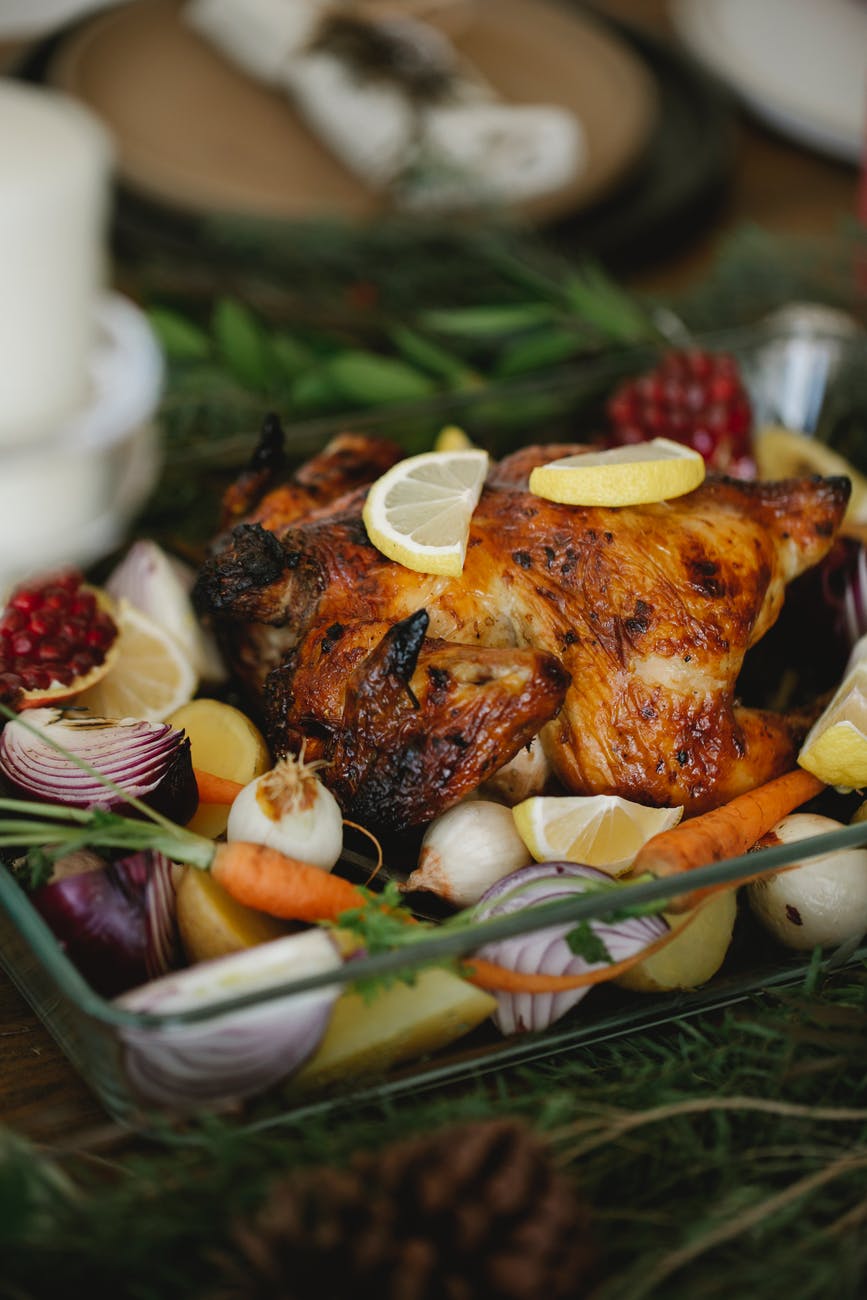Support your digestion over the festive season!
The festive season brings a wonderful array of food and drink to enjoy but it’s a time of year when it’s easy to overindulge!
All the overeating, especially of rich food, and drinking more alcohol puts a strain on the digestive system and people commonly suffer heartburn, indigestion (including bloating, gas or nausea), constipation or diarrhoea, as a result. This year be prepared and find out how to support your digestion, so you can enjoy the season’s fayre in a little more comfort!

Digestion starts the minute we smell and see food. Our mouths start to water and we produce saliva which starts to break down starchy foods. The stomach produces stomach acid and digestive enzymes to start breaking down protein. When food arrives in the small intestine, the pancreas releases digestive enzymes, to further break down food and the gallbladder releases bile, to help break down fat. Then, when our food is broken down properly our body can absorb the nutrients from it. Food waste needs to be eliminated otherwise it can hang around and ferment in the gut, leading to bloating, gas and discomfort.
Top Ten Tips for Digestion
- Chew, chew, chew!! – to start the digestion process and stimulate your body’s own digestive enzymes. Not chewing enough could be the reason behind any bloating or gas.
- Slow down while you’re eating! – this allows the body to release its own digestive enzymes to break down the food, again reducing the chance of bloating. It also gives time for signals to reach your brain to say you are full up, reducing the chance of overeating, which can cause heartburn (as well as weight gain!).
- Eat when you’re relaxed! – if we’re stressed our digestive system doesn’t work properly. The body prioritises dealing with the stress over digesting our food. So if you can, wait until you’re feeling calmer before you eat. If you have to eat, choose something easier on the digestive system like soup or yoghurt.
- Have bitter foods –such as rocket, endive, chicory at the start of a meal, to stimulate digestive enzymes. Or eat pineapple or papaya before a meal, which naturally contain digestive enzymes.
- Add raw apple cider vinegar or lemon juice to a salad or bitter leaves, to stimulate the production of digestive enzymes. Or add 1- 3 tsp of raw apple cider vinegar to a little water before a meal, to help balance stomach acid levels, which in turn supports digestion.
- Include some raw vegetables– for a source of digestive enzymes and which can help constipation too. These can include fermented vegetables such as sauerkraut and kimchi.
- Add in fibre from ground flaxseeds or chia seeds– to help constipation. Try 1 – 2 tablespoons of ground flaxseeds a day, sprinkled on food or soaked. Or soak 1 – 2 tablespoons of chia seeds overnight in water or non-dairy milk to eat the next morning.
- Drink plenty of water but not with your meals – aim for 8 glasses of water or herbal teas a day to help prevent constipation (especially if taking fibre, as it swells up) and help flush out any toxins. However don’t drink a lot of water with meals as this can reduce stomach acid levels, which are needed to digest your food.
- Don’t eat late – the digestive system starts to ‘switch off’. Keep to small, light meals or snacks if you are planning to eat late.
- Avoid fruit straight after a large meal – as it may ferment, creating gas and bloating.
More Tips........
- Try an ‘After Dinner’ herbal tea– to support digestion –containing aniseed, cardamom, chicory, fennel, and liquorice. Have after a main meal instead of a regular tea or coffee!
- Try Ginger Tea or Camomile Tea –which are also great for supporting digestion.
- Avoid the common culprits as much as you can! For Heartburn: caffeine, alcohol, fatty foods, fizzy drinks, tomatoes, chocolate and peppermint. For indigestion: excess caffeine or alcohol, greasy foods and spicy foods.
- Soak your nuts and seeds – to make them easier to digest. Soak in cold water overnight and in the morning rinse and keep in the fridge. Use that day.
- Include fermented foods and drinks – eg sauerkraut, kimchi, kefir to provide beneficial bacteria and support the whole digestive system
- Consider food intolerances – gluten and dairy are common allergens and festive food can often contain both of these, so for some people just an over consumption of these foods can cause a problem. Gluten is a difficult to protein to digest anyway, even if you don’t have an intolerance and so for some that can cause bloating or discomfort. If you suspect any foods are a problem, try taking a digestive enzyme, to see if that helps. However, it may be that you need to avoid certain foods completely. Consider a food intolerance test, which looks at IgG anti-bodies in the blood. We sell these test kits in the shop.
What supplements can help?
Here are some commonly used supplements to support a number of digestive symptoms:
- Digestive enzymes – these help to break down food, to ensure we’re getting as many nutrients from our food as possible. They are very useful if you’re eating large, heavy or rich meals or when eating out and you’re not sure if the meal contains a ‘problem’ food for you. Choose a broad spectrum digestive enzyme to break down different food groups. Take at the start of a meal. Try these for: indigestion, bloating and gas.
- Probiotics – these are the beneficial bacteria in the gut. We need good levels of these for all aspects of a healthy gut, including digestion. Sugar, alcohol, stress and anti-biotics all disrupt our levels of good bacteria. Try these for: gas, constipation, diarrhoea
- Aloe Vera Juice – is naturally cooling and soothing. It has as anti-inflammatory action on the digestive tract, so is great for supporting acid reflux and indigestion, as well as any discomfort in the gut. Try taking the liquid for heartburn and the tablets for digestive complaints lower down in the gut. Try this for: gas, bloating, indigestion, heartburn
- Ginger – is well known for relieving nausea but it is also known as a carminative, helping to release excessive gases from the digestive system. It has also been traditionally used as a digestive stimulant, stimulating the release of stomach acid and digestive enzymes, which are needed to break down our food properly. Try this as a supplement for: indigestion, gas, bloating and discomfort, as well as nausea.
- Slippery Elm – has a soothing action on the digestive tract. Some supplements combine this with marshmallow and gamma oryzanol and sometimes licorice and aloe as well, for further digestive support. Try this for: heartburn, along with digestive enzymes
- Herbal Bitters – a herbal tincture containing a group of herbs knows as ‘stomach bitters’, traditionally used to support digestion in general. Try this for flatulence and bloating as well general digestive support.
- Herbal Indigestion remedy – a combination of the herbs: artichoke, dandelion, peppermint and boldo. Try this for : indigestion, feeling full and flatulence
- Magnesium – a muscle relaxant, so great for stress and it helps motility in the gut. Try this for: constipation.
- FOS (fructo-oligosaccharide) – a soluble fibre (from chicory root) also known as a pre-biotic, that feeds the good bacteria and helps bowel movements. It comes as a powder and you can add to water and drink or add straight to food (it has a sweet taste). Try this for: constipation.
- Artichoke Extract – Artichoke is a food that stimulates bile flow so this supplement is often taken prior to a meal to support fat digestion. Try this for: discomfort or indigestion from eating fatty foods.
In Summary
Heartburn and Indigestion
- Herbal ‘Indigestion’ Remedy
- Digestive enzymes
- Slippery Elm –for heart burn
- Ginger
- Aloe Vera Juice
- Artichoke Extract – to support fat digestion
Diarrhoea
- Probiotics
Constipation
- Magnesium
- Probiotics
- Ground flaxseeds/Chia seeds
- FOS
Bloating and Gas/flatulence
- Herbal Bitters
- Herbal Indigestion remedy
- Digestive Enzymes
- Ginger
- Probiotics
- Aloe Vera tablets
A final thought
This is a time of celebration so relax and enjoy your food without feeling guilty! You can be gluten free, dairy free, soya free, egg free and refined sugar free and still have plenty to enjoy over Christmas. Come in and see what goodies we have in the shop! Here’s wishing you a very happy Christmas and a healthy and happy New Year!
Sources:
- Lamberts
- BioCare
- A Vogel
- Pukka
- Dr Axe
- Higher Nature’s book: Nutritional solutions for optimising digestive health, by Holly Taylor
- www.nhs.uk
